
Born to Kill is a 1947 American film noir co-starring Lawrence Tierney, Claire Trevor and Walter Slezak, with Esther Howard, Elisha Cook Jr., and Audrey Long in supporting roles. Directed by Robert Wise for RKO Pictures, the feature was the first film noir production by Wise, whose later films in the genre include The Set-Up (1949) and The Captive City (1952).

Pathé Exchange, commonly known as Pathé, was an American film production and distribution company, largely of Hollywood's silent era. Known for its groundbreaking newsreel and wide array of shorts, it grew out of the American division of the major French studio Pathé Frères, which began distributing films in the United States in 1904. Ten years later, it produced the enormously successful The Perils of Pauline, a twenty-episode serial that came to define the genre. The American operation was incorporated as Pathé Exchange toward the end of 1914 and spun off as an independent entity in 1921; the Merrill Lynch investment firm acquired a controlling stake. The following year, it released Robert J. Flaherty's groundbreaking documentary Nanook of the North. Other notable feature releases included the controversial drama Sex (1920) and director/producer Cecil B. DeMille's smash-hit biblical epic The King of Kings (1927). During much of the 1920s, Pathé distributed the shorts of comedy pioneers Hal Roach and Mack Sennett and innovative animator Paul Terry. For Roach and then his own production company, acclaimed comedian Harold Lloyd starred in many feature and short releases from Pathé and the closely linked Associated Exhibitors.
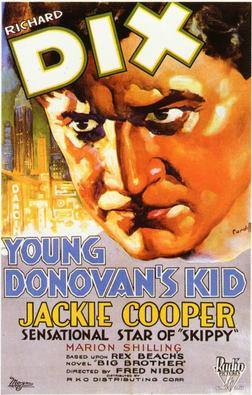
Young Donovan's Kid is a 1931 American pre-Code melodrama film directed by Fred Niblo, from a screenplay by J. Walter Ruben, based upon the short story, Big Brother, by Rex Beach. It was a remake of a 1923 silent film of the same, produced by Famous Players-Lasky, and directed by Allan Dwan. This version starred Richard Dix, Jackie Cooper, and Marion Shilling. The film also featured Boris Karloff in a supporting role as "Cokey Joe".

White Shoulders is a lost 1931 American pre-Code comedy-drama film directed by Melville W. Brown and starring Mary Astor and Jack Holt, with major supporting roles by Ricardo Cortez and Sidney Toler. The film was produced and distributed by RKO Pictures. The screenplay by Jane Murfin and J. Walter Ruben was adapted from Rex Beach's short story, The Recoil.

Headline Shooter is a 1933 American pre-Code drama about the life of a newsreel photographer. Director Otto Brower intertwined the screenplay written by Agnes Christine Johnston, Allen Rivkin, and Arthur Kober, with actual newsreel footage of natural and man-made disasters. The film starred William Gargan, Frances Dee, Ralph Bellamy, and Jack LaRue.

The Crime Doctor is a 1934 American crime drama directed by John Robertson from a screenplay by Jane Murfin, adapted from the novel The Big Bow Mystery by Israel Zangwill. The film stars Otto Kruger, Karen Morley, and Nils Asther. RKO Radio Pictures produced and distributed the film which was released on April 27, 1934.

Dangerous Corner is a 1934 American mystery film directed by Phil Rosen, using a screenplay by Anne Morrison Chapin, Madeleine Ruthven, Ralph Berton, and Eugene Berton, which was based on a novel and play of the same name by J. B. Priestley. It starred Virginia Bruce, Conrad Nagel, and Melvyn Douglas.

A Dog of Flanders is a 1935 American drama film directed by Edward Sloman, based on a screenplay by Ainsworth Morgan from the story by Dorothy Yost, which she adapted from the 1872 novel of the same name by Ouida. The film stars Frankie Thomas, appearing in only his second film.

The Arizonian is a 1935 American Western film directed by Charles Vidor and starring Richard Dix, Margot Grahame, Preston Foster, and Louis Calhern. The screenplay was by Dudley Nichols. The film was released by RKO Radio Pictures on June 28, 1935.
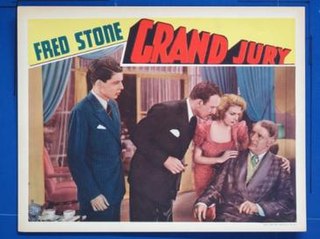
Grand Jury is a 1936 American crime drama film directed by Albert S. Rogell from a screenplay by Joseph A. Fields and Philip G. Epstein, based on a story by James Edward Grant and Thomas Lennon. Produced and distributed by RKO Radio Pictures, it premiered in New York City on July 31, 1936, and was released nationwide the following week on August 7. The film stars Fred Stone, Louise Latimer and Owen Davis, Jr.
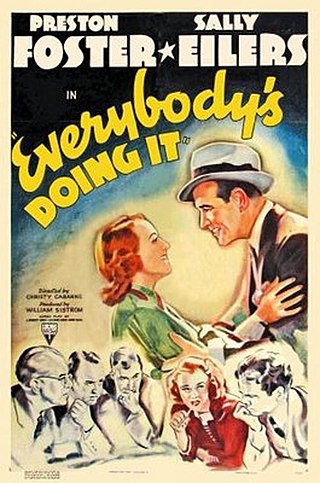
Everybody's Doing It is a 1938 American comedy film directed by Christy Cabanne using a screenplay by J. Robert Bren, Edmund Joseph, and Harry Segall, based on George Beck's story. RKO produced and distributed the film, releasing it on January 14, 1938. The movie stars Preston Foster and Sally Eilers.
Double Danger is a 1938 American crime drama directed by Lew Landers, using a screenplay by Arthur T. Horman and J. Robert Bren based on Horman's story. The film stars Preston Foster and Whitney Bourne, with supporting roles by Donald Meek and Samuel S. Hinds. Produced by RKO Radio Pictures, it was released on January 28, 1938.
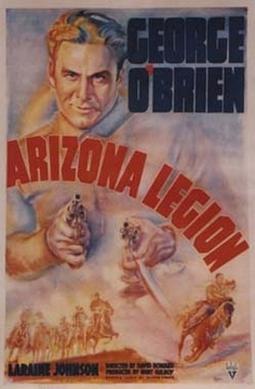
Arizona Legion is a 1939 American Western film directed by David Howard from a screenplay by Oliver Drake, based on Bernard McConville's story. Produced and distributed by RKO Radio Pictures, it was released on January 20, 1939, and stars George O'Brien and Laraine Day.
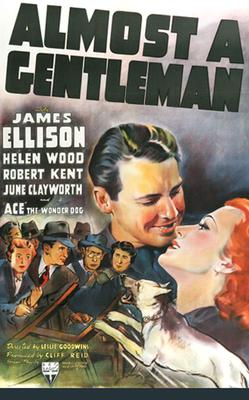
Almost a Gentleman is a 1939 American drama film directed by Leslie Goodwins from a screenplay by David Silverstein and Jo Pagano, based on the story by Harold Shumate. The film stars James Ellison, Helen Wood and Robert Kent. It was released by RKO Radio Pictures on March 31, 1939.

Around the World is a 1943 American comedy film produced and directed by Allan Dwan, from an original screenplay by Ralph Spence. RKO Radio Pictures premiered the film at the Globe Theater in New York on November 24, 1943. The film has a large cast, and stars Kay Kyser and his band, Mischa Auer, Joan Davis, Marcy McGuire, Wally Brown, and Alan Carney.
Charles R. Rogers, was an American film producer whose career spanned both the silent and sound film eras. Rogers began his career on the 1924 silent film, A Cafe in Cairo, produced by the short-lived Hunt Stromberg Productions. After Stromberg ceased productions in 1925, Rogers would found his own independent company, Charles R. Rogers Productions. He would also produce for major studios such as RKO Radio Pictures, Universal, and United Artists. The pinnacle of his career would be from 1936 to 1938 when he was chosen as the vice-president in charge of production for Universal Pictures. He died as the result of injuries sustained in a car accident in 1957.
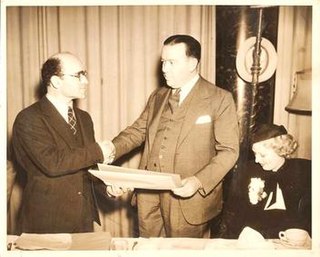
Cliff Reid, also known as George Clifford Reid, was an American film producer and film production studio founder during the 1930s and 1940s. In addition he also directed film shorts, and was the assistant director on several feature films.
Arthur T. Horman was an American screenwriter whose career spanned from the 1930s to the end of the 1950s. During that time he wrote the stories or screenplays for over 60 films, as well as writing several pieces for television during the 1950s.

Samuel J. Briskin was one of the foremost producers of Hollywood's Golden Age, and head of production during his career at three of the "Big 8" major film studios: Columbia Pictures (twice), Paramount Pictures, and RKO Pictures. In the late 1950s, he was briefly on the board of directors of another major, Metro-Goldwyn-Mayer. During World War II, Briskin served in the army's Signal Corps as a film producer, attaining the rank of lieutenant colonel. After the war he co-founded Liberty Films with Frank Capra. They were later joined by William Wyler and George Stevens. The studio only produced two films, but both are now considered classics: It's a Wonderful Life and State of the Union. All three of his brothers were also film producers, as well as one of his sons, and his sister was married to the eventual Chairman of Columbia, where Briskin spent the last decade of his life as a vice-president and head of production until his death in 1968 from a heart attack.
Lee Marcus, also known as Lee S. Marcus, was an American film producer of the 1930s and 1940s. During his fifteen-year career he produced over 85 films, most of them between 1934 and 1941 while he was at RKO Studios. Prior to his production career, Marcus worked for FBO and then RKO as a sales executive, reaching the level of vice president in both organizations. At RKO, he was head of production of the studio's b-films during the late 1930s and the beginning of the 1940s. He was also responsible for producing what many consider to be the first film noir, 1940's Stranger on the Third Floor.
















